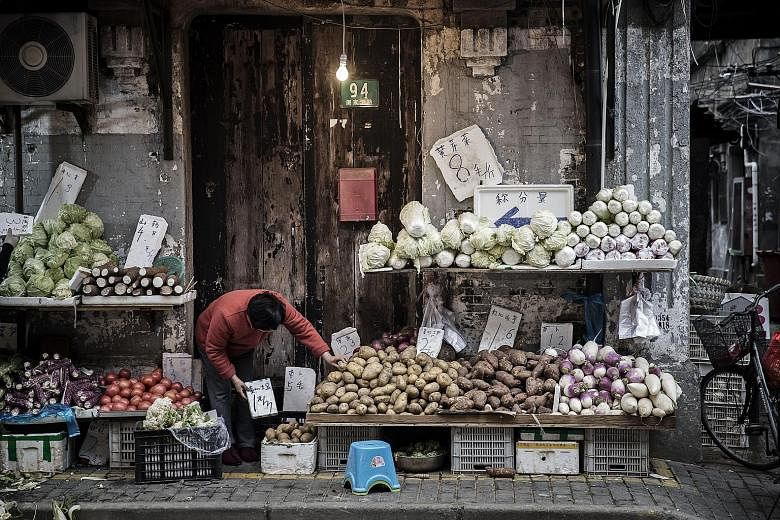BEIJING • China's consumer inflation picked up last month, boosted by price gains for food and services, signalling demand in the world's second-largest economy is stabilising after accelerated fiscal stimulus and a year of interest rate cuts.
The consumer price index (CPI) rose 1.5 per cent in November from a year earlier, the National Bureau of Statistics said yesterday, compared to the 1.4 per cent median estimate in a Bloomberg survey and 1.3 per cent in October.
The producer price index fell 5.9 per cent, compared to a projected 6 per cent drop, extending declines to a record 45 months.
"We expect inflation to rise going into 2016," Mr Julian Evans-Pritchard, China economist at Capital Economics in Singapore, wrote in a report. He said he is not overly concerned by factory deflation because "with the price of domestic goods holding up better, many firms should actually benefit from these lower input costs".
Firming inflation signals some stabilisation in demand after six central bank interest rate cuts since November last year and expanded government spending.
The November rise in consumer prices was driven by an uptick in food prices. Food CPI was up 2.3 per cent year-on-year, while non-food items rose 1.1 per cent.
The pick-up still leaves room for more easing, as the CPI is forecast to rise at half of the government's target this year, according to a Bloomberg survey.
The CPI remains well under the government's 2015 price target of 3 per cent, raising concerns that China could be sucked into a Japan- style deflationary trap.
With the economy sputtering after years of double-digit growth, analysts predict Chinese consumer prices are unlikely to pick up much in the near future.
"With corporate confidence already at a six-year low, persistent deflation might also put the economy at risk of a downward spiral," said HSBC economists in a note.
The risk that Chinese consumption might sink is not only a big worry for domestic policymakers but also for foreign firms which have invested heavily on the assumption that Chinese spending would help offset weak demand elsewhere.
Chinese manufacturing has been stagnating for more than three years, with wholesale prices sliding continuously as legions of small companies compete desperately to stay above water.
"Continued deflationary pressure in manufacturing prices calls for further monetary easing," Ms Eva Yi, an economist at China International Capital in Hong Kong, wrote in a note. "More importantly, fiscal policy will have to pull more weight towards stabilising growth."
The central government has increased spending to add stimulus in recent months to help achieve its target for economic growth of about 7 per cent this year. Fiscal spending jumped 36.1 per cent in October from a year earlier to 1.35 trillion yuan (S$295 billion).
REUTERS, BLOOMBERG

